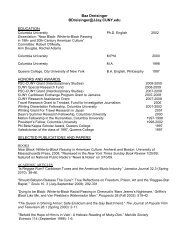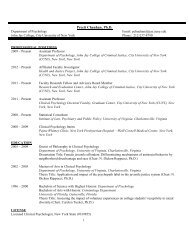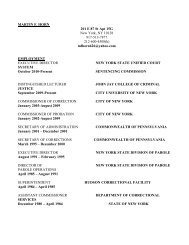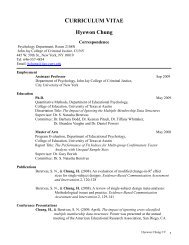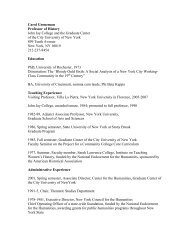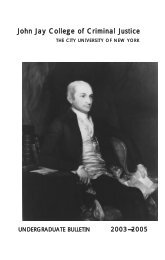Bulletin - John Jay College Of Criminal Justice - CUNY
Bulletin - John Jay College Of Criminal Justice - CUNY
Bulletin - John Jay College Of Criminal Justice - CUNY
Create successful ePaper yourself
Turn your PDF publications into a flip-book with our unique Google optimized e-Paper software.
Courses <strong>Of</strong>fered<br />
chemistry, or who received a grade of less than 80% on the<br />
Chemistry Regents. This course is restricted to Forensic Science<br />
majors.<br />
Co-requisite: MAT 104 or MAT 105<br />
CHE 102 General Chemistry I-B<br />
7 hours; 3 hours lecture, 1 hour recitation, 3 hours laboratory; 3 credits<br />
This course is the second semester of the CHE 101-102 sequence.<br />
Topics include the hydrogen atom, electron configurations, Lewis<br />
structures, theories of bonding, thermochemistry, properties of pure<br />
liquids and solids, solutions, and colligative properties. Laboratory<br />
exercises will include small scale, semi-quantitative experiments<br />
related to the lecture topics covered in the CHE 101-102 sequence.<br />
The entire 101-102 series must be completed in order to receive<br />
credit as a general education science equivalent.<br />
Prerequisite: CHE 101. This course is restricted to Forensic Science<br />
majors<br />
CHE 103 General Chemistry I<br />
7 1/2 hours: 3 hours lecture, 1 1/2 hours recitation, 3 hours laboratory; 5 credits<br />
This is a basic course in chemistry dealing with modern atomic and<br />
molecular theory. It introduces the basic properties and reactions of<br />
the elements and the compounds, which will be explored in greater<br />
detail in General Chemistry II. Laboratory exercises stress principles<br />
of qualitative and semi-quantitative experimentation. They will<br />
foster a better understanding of chemical principles and ensure that<br />
the necessary skills are developed to work in a scientific laboratory<br />
safely and effectively. This course is designed for students with a<br />
science background and for Forensic Science and Fire Science<br />
majors. Regents level high school chemistry is highly desired.<br />
Prerequisites: Placement into MAT 141 or higher, or placement into<br />
MAT 104 or MAT 105 and a score of 80% or higher on the New<br />
York State Chemistry Regents. Students who did not take the<br />
Chemistry Regents will need departmental permission.<br />
CHE 104 General Chemistry II<br />
7 ½ hours: 3 hours lecture, 1 ½ hours recitation, 3 hours laboratory; 4 credits<br />
This is the second half of beginning chemistry. It builds on the basic<br />
properties and reactions of the elements and the compounds learned<br />
in the first semester of general chemistry and ends with an<br />
introduction to organic chemistry. The laboratory stresses principles<br />
of qualitative and semi-quantitative experimentation and fosters<br />
competence in the skills needed to work safely and effectively in a<br />
scientific laboratory. This course is designed for students with a<br />
science background and for Forensic Science and Fire Science<br />
majors. Regents level high school chemistry is desired.<br />
Prerequisites: CHE 103, or an average grade of 2.0 or better in CHE<br />
101-102 or equivalent, and completion of MAT 104 or MAT 105 or<br />
equivalent<br />
CHE 201-202 Organic Chemistry<br />
7 1/2 hours each: 3 hours lecture, 1 1/2 hours recitation, 3 hours laboratory; 4 credits<br />
Introductory study of properties and behavior of organic molecules,<br />
including nomenclature, structure and bonding, reaction mechanisms,<br />
synthetic methods, and modern spectroscopic techniques for<br />
structural analysis. Concurrent laboratory work utilizing modern<br />
semi-micro methodology for synthesis, purification and analysis.<br />
Prerequisites: ENG 101, CHE 104, which is a prerequisite for CHE<br />
201. CHE 201 is a prerequisite for CHE 202.<br />
CHE 220 Quantitative Analysis<br />
9 hours: 3 hours lecture, 6 hours laboratory; 4 credits<br />
A balanced treatment of the classical methods of gravimetric and<br />
volumetric analysis, including acid-base, precipitation,<br />
complexometric and redox titrations.<br />
Prerequisites: ENG 101 and CHE 104<br />
62



